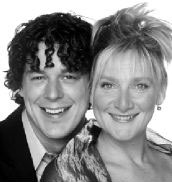2002 LESBIAN & GAY FILM FESTIVAL
runs Oct. 18-24 at Cinerama, EMP, Harvard Exit, Jewel Box Theatre, Little Theatre, and others
schedule and information: 206-323-4274, www.seattlequeerfilm.com
SEATTLE’S WEEKLONG Lesbian & Gay Film Festival traditionally presents a programming challenge: Its fall presence means that pictures of queer interest consistently get scooped by spring’s SIFF or, in fact, open before the gay fest itself does. Then there’s the problem of studios’ overprotectiveness about their de facto gay products. A few years ago, according to festival director Justine Barda, Boys Don’t Cry was declared off-limits when a Fox representative said he didn’t want the film to be “pigeonholed.”
As a result, the festival sometimes has to make do with what it can get its hands on, including features that have already screened commercially. This year, Sherman Alexie’s The Business of Fancydancing— the story of a conflicted, gay Native American poet confronting his past—gets a deserved big-screen reprise after its underseen run in May (when our Sheila Benson called it a “vivid, insightful, ruminative directorial debut”).
Whether You Like It or Not: The Story of Hedwig will be a gift to anyone who hasn’t seen this DVD extra—it’s Laura Nix’s exhilarating documentary tracing the course of John Cameron Mitchell’s transsexual triumph from its original drag club inception to Sundance award-winner. Appropriately, Hedwig and the Angry Inch is also back, this time as a rousing sing-along that truly merits the Cinerama’s knock-you-on-your-ass screen and sound system. Stephen Trask, the musical’s ingenious composer, and Nick Garrison, Seattle’s own dazzling stage Hedwig, will both attend the event.
YET IT’S THE LITTLE stuff that most validates the festival in an increasingly Will & Grace-assimilated culture. Its programming restrictions have, interestingly enough, become the fest’s greatest strength: genuine, complex reflection on homosexual culture, far removed from slick Hollywood treatments.
Like Queer as Folk a couple of years back, a BBC television series is again one of the festival must-sees. The multi-episode Bob & Rose, by Folk creator Russell T. Davies, manages to put across the unlikely love affair between a gay man and straight woman as a complicated and very funny paean to human loneliness.
Among the requisite, sometimes international, but often limp hot-guy flicks (take your pick) are screenings that, in essence, strive to reacquaint gay viewers with themselves. El Rey de Rock ‘n’ Roll engagingly celebrates how El Vez—currently in town with Teatro ZinZanni—forged a career with his pansexual, multicultural spin on the kitsch of the King. Female firefighters are lauded in Some Real Heat. From Hope Along the Wind, the story of seminal gay rights pioneer Harry Hay, to Ruthie & Connie, a loving look at the decades-long love of an elderly lesbian couple, the week’s best bets may be the short documentaries intent on keeping queer history alive.
The highlight of the festival, in fact, is nothing more than someone’s private memories. Harold’s Home Movies is a collection of 92-year-old Puget Sound resident Harold O’Neal’s 8mm and 16mm films documenting his life. Overlaid with a soundtrack, the images can be as leisurely and hit-or-miss as anyone’s home movies would be, but there’s a resonant poignancy in watching a group of gay men romp with perfect, drunken happiness in Sacramento’s American River circa 1946. This is the kind of simple gay human contact still missing from mainstream filmmaking.
Whether by default or design, the festival remains important because it gives the gay community the opportunity not just to see where we are and where we’re headed but, vitally, to remember where we’ve been.









